Who Knows One?
Whether it's crowd size in Glendale or casualties in Gaza, what numbers can we trust? Who really knows one?
I send this out a few hours before Tisha B’Av, with an attack by Iran or its proxies on Israel possible at any time. We pray for safety and peace.
Who knows one? That’s the question that was on my mind all weekend. It began in the most pleasant of ways, as I watched the Israeli rhythmic gymnastics team at the Olympics take a silver medal, completing a stellar haul of seven medals for the Jewish state, the most ever.
In the first of their two routines, they chose music that would be instantly familiar to Jews around the world, the song “Who Knows One?” (Echad Mi Yodaya) from the Passover seder. Specifically, this playful song, which likely originated in 15th century Germany, but also has antecedents in places as far flung as Majorca, Cochin, Avignon and Prague, fulfills an ancient purpose laid out centuries before in the Talmud (Pesachim 108b-109a), to “keep the children awake” until the end of the seder. This ingenious song employs several educational objectives that have always been preeminent in Jewish culture: intergenerational questioning, intellectual curiosity, a yearning for objective, quantifiable truth - and, oh yes, FUN - to teach some key theological and historical concepts.
Who knows one (who/what is one)? God is one. Two? The two tablets of the covenant. Three? The patriarchs? Four? The matriarchs? And five golden rings….
Uh, I mean five books of the Torah, of course. And so on. It’s an entire Hebrew School curriculum in a neat five-minute package. It’s both memorable and memorizable. Judaism is supposed to be joyous, even as we recall the bitterness of slavery. Everyone knows that, and just about every Jew has heard of this song - in Israel, at least, and so now it has been turned into an Olympic accompaniment for secular athletes playing with hoops. What is the connection? Well, Jews have been jumping through hoops for centuries, just to survive. So maybe it’s a tribute to Jewish resilience during what has been a very traumatic year. Maybe there is an implied seder-inspired wish that while this year we are enslaved to our pain, next year may we all be free - and may our hostages be free as well.
You can see the routine below (recorded from a prior competition).
Seeing this routine was, for me, the most joyously Jewish moment at the Olympics since Aly Raisman performed her 2012 floor exercise in London to Hava Nagila.
I must add that once again, the most joyous Jewish song imaginable was picked. The title actually means, “Let’s be joyous!”
But beyond the joy, the selection of “Who Knows One” had a far deeper resonance for me last weekend, because a question that keeps on coming up is precisely that: Who knows one? Who can we trust to quantify, to discern objective, numeric, objective truth in the face of massive and often conflicting data?
We saw that in the Olympics themselves, where the difference between victory and defeat was sometimes measured in amounts of time that human beings can’t even begin to fathom. Noah Lyles won the 100 meter dash by five thousandths of a second, beyond the capacity of a photo finish to capture. For those who are scoring at home, five thousandths is 0.005 of a second.
And who knows 0.005 of a second? It’s 1/20th of the time it takes for a human to blink. Lyles won by 0.4 flaps of a hummingbird’s wings. The amount of time for him to feel his foot hitting the ground on his final step - for the nerve signals to go from foot to brain - took longer than his margin of victory.
This number is so mind-boggling that it should be added to the “Who Knows One” song in next year’s seder. Come to think of it, I’ve seen some seders take less time than Lyles’ margin of victory.
The real question here, though, is whether a number so minute can really be measured at all. If it’s beyond even a high speed camera’s eye to see, what’s the point in parsing it out? Can’t they just have called it a tie and given two runners gold medals - or three?
And while we’re talking about timing, how can a few extra seconds before an inquiry was registered be what keeps gymnast Jordan Chiles from keeping a medal she had already won? And now there seems to be a question as to whether the protest was registered on time. Just give the two athletes medals and call it a day?
Which brings me to my main point. Usually it’s not the numbers themselves that are in question but the source of the information. The seder song asks “Who knows one?” not “What/ Who constitutes one?” even though all the examples given in the lyrics answer the latter question and not the former. I suppose there is an implied answer here, that the leader of the seder in fact is the one who knows one and is teaching it to the child who asks.
Or perhaps the answer to both questions is ultimately God. God determines all objective fact and God is, in fact, a unity. Some believe the song found its way into the seder to remind participants - like those rabbis in B’nai Brak alluded to an earlier section - that it would soon be time to recite the morning Sh’ma, a prayer that affirms God’s Oneness.
But the song doesn’t specifically answer the question: Who knows one?
And it happens to be THE question of our time. Who can we trust with the numbers? Who really knows one, two and three?
Judaism is saying, “Get your facts straight,” and numbers, as the building blocks of objective truth, are standing in for all facts, a synecdoche for all objective truth. If trust in the source of the numbers breaks down, truth can no longer be verified. Control numbers and you control everything. This is especially true in a digital age, when information is literally encoded in numbers.
While many affirm that Donald Trump should never again have his finger on the nuclear codes, we need to go further and state that he must never again be the source of our numbers. Who knows one? Not him. Trump is known for exaggeration on his best days and outright breaks from reality on his worst? Yesterday was one of his worst, and not surprisingly, the fantastical Tweet in question had to do with crowd size.
Who knows 10,000? Who knows a million? Who knows a crowd greater than MLK’s? Who knows the correct numbers? Not him.
Meanwhile, the ongoing Gaza tragedy saw a perplexing occurrence this weekend. An attack on a school (not in session), a place used by Hamas for command and control, led to a number of casualties. That much is certain. Each human life is of infinite value - that is certain too, though there are special rules in dealing with terrorists. And since Hamas’s numerical estimates, like Trump’s, are not dependable, why give them the benefit of the doubt?
News sources in Israel and internationally were all over the map on this one, with numbers ranging from the low teens to over a hundred. The Hebrew newspaper I show below (Yediot Achronot) didn’t highlight it on the front page, which instead featured the gymnastic team’s medal. The Jerusalem Post reported two wildly diverging estimates as to the casualties, and put the story below the fold and below the Olympic story. Ha’aretz reversed the two, putting the gymnasts on the bottom while highlighting the conflicting death tolls in their headline.
Kudos to the Israeli press for being skeptical and careful. I can’t be overly critical of their favoring the feel-good story of the gymnasts, given the daily dose of depressing news Israelis typically receive.
The story below, written by New York Times reporters and taken here from the Boston Globe, has a misleading headline and a telling error within.
Note that they justify the usage of the Hamas stats by saying this (circled in orange)
Really? Broadly reliable? Who knows one? Evidently, according to the world press, the Gaza Health Ministry - run by Hamas - knows. Expecting Hamas to get a casualty count right is like asking Donald Trump to count votes in Georgia.
For context on Saturday’s event, see this posting below from a reputable Israeli writer, then his follow up.
Please understand. It is quite possible that innocent people died. It is quite possible that the numbers are higher than Israel has acknowledged. And it more than possible that a ceasefire could have been reached and hostages released long ago. I also contend that a few more dead terrorists are not going to lead to “total victory.” Total victory would be the regional alliance that the US is laying out, but it is a victory that some on each side do not want.
My only point here is that one of the great dangers we all face right now is a depletion of trust. We have come to doubt everything, which is just what extremists want. Before we can move forward, whether in diplomacy or democracy, we have to be able to know whom we can trust.
No source is completely infallible. In the end we need to trust our own senses, and we can begin with the smell test. I trust some major news organizations, but only when those facts are verifiable. No blank checks.
What I do know for certain is who not to trust: terrorists, apologists and anyone obsessed with the size of his throng.


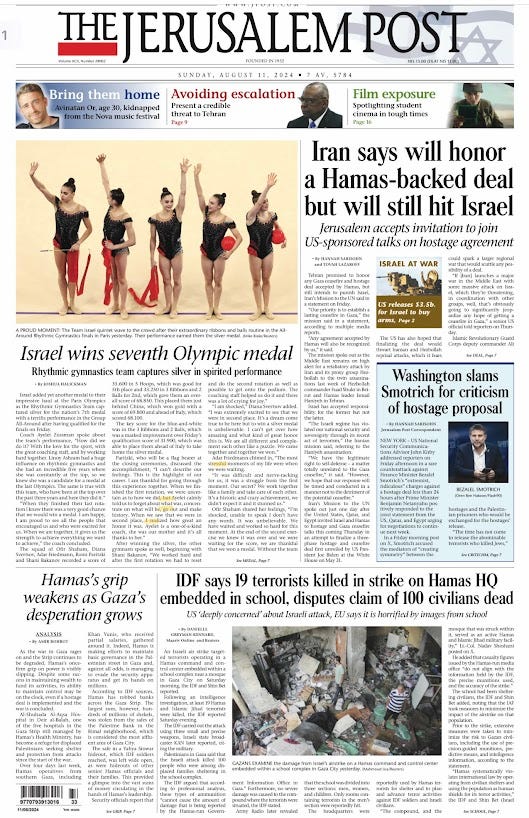

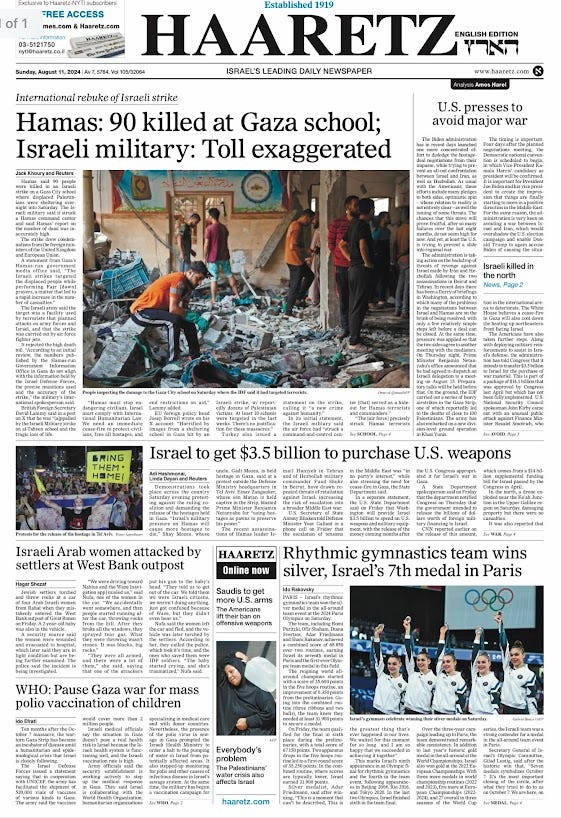
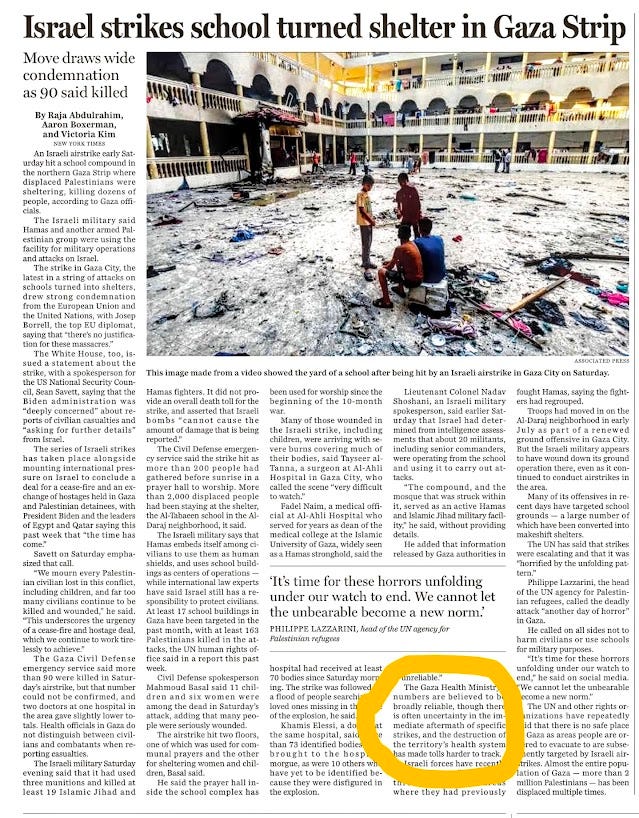
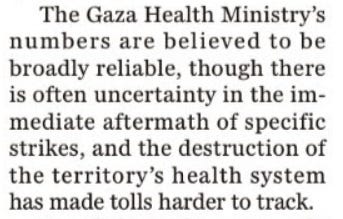
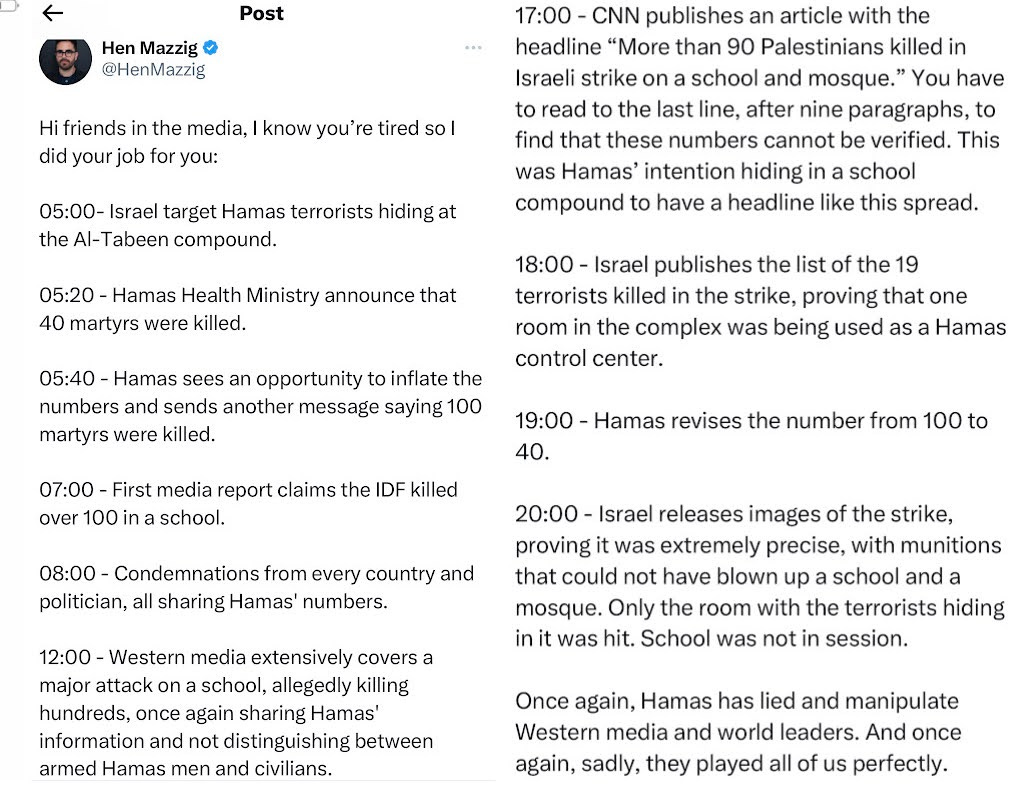
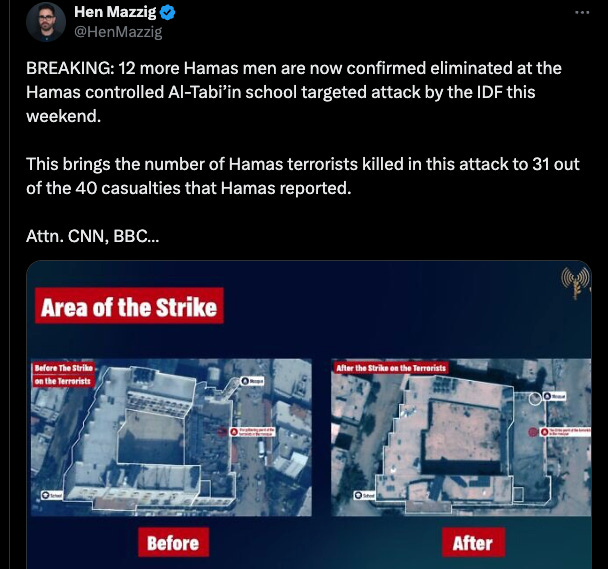
No comments:
Post a Comment